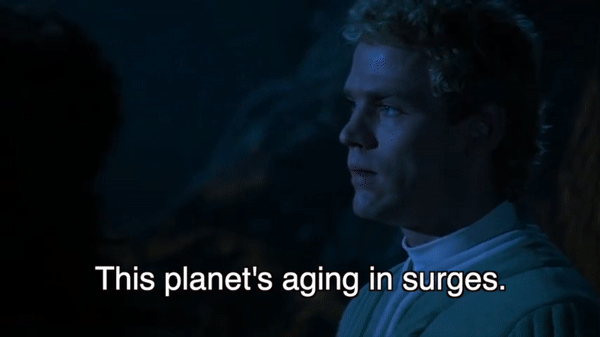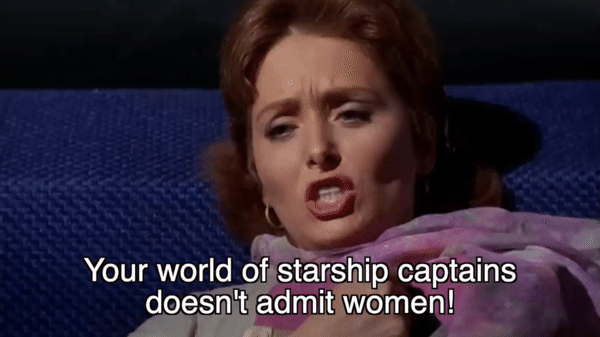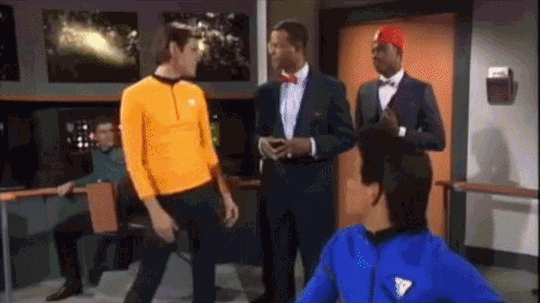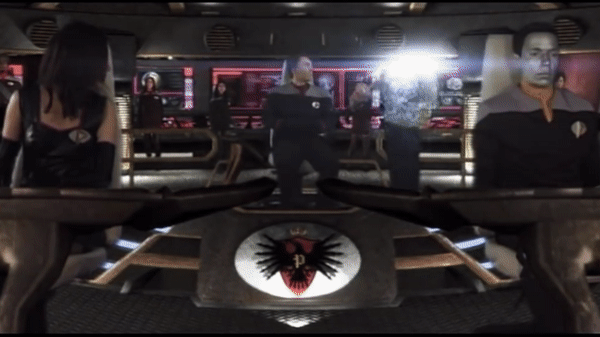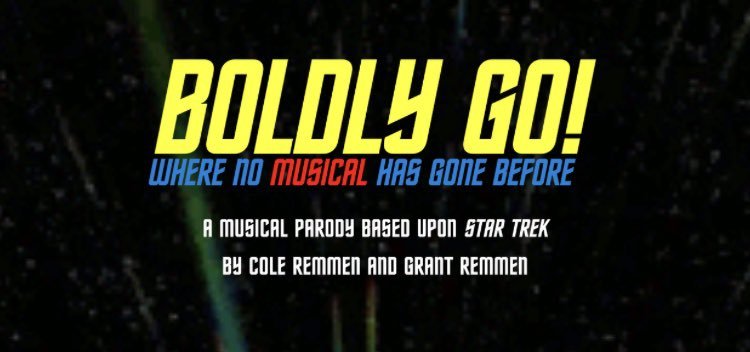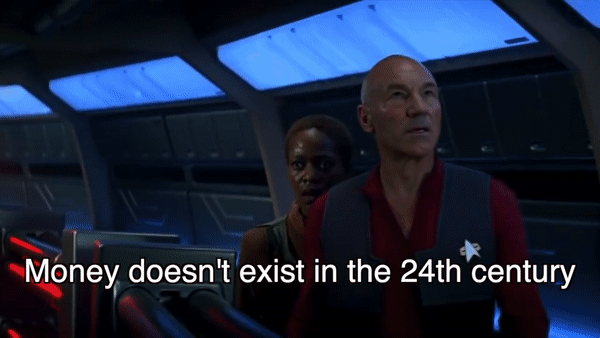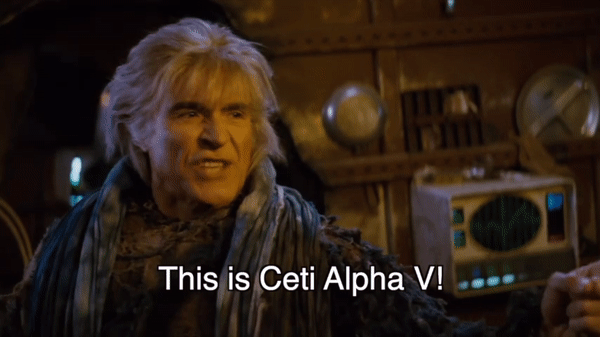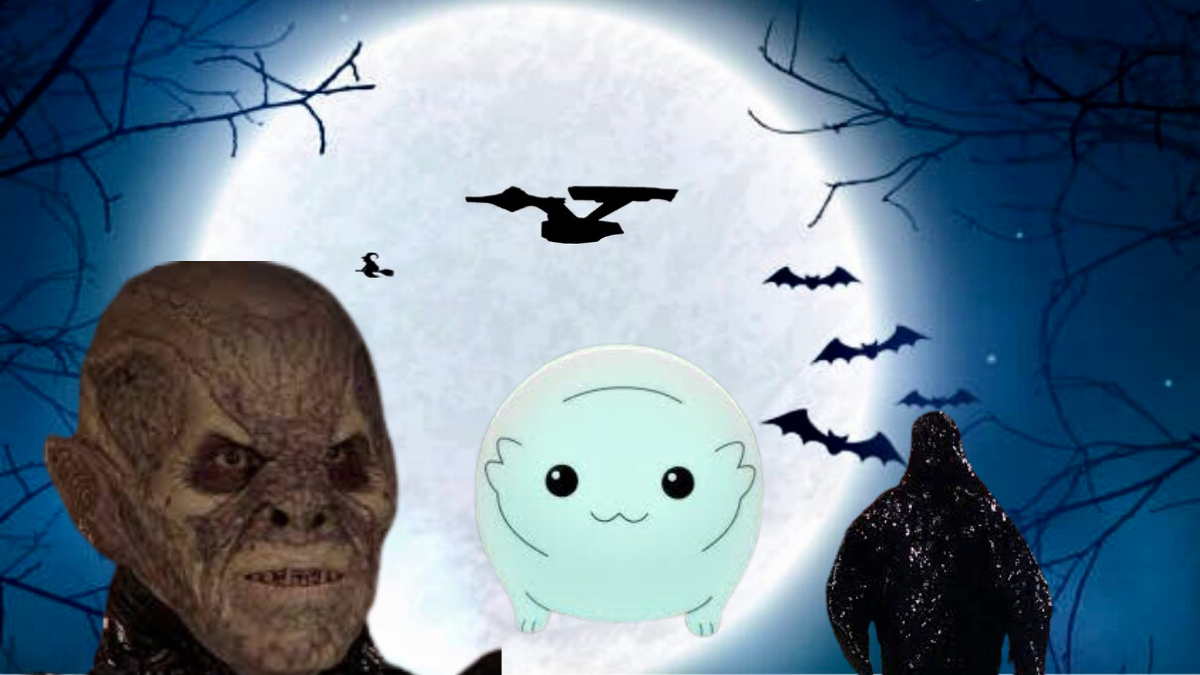GUEST POST: Brent Black Brags, "I Got Away With a STAR TREK Parody (And You Can Too!)"

Brent Black, writer of KHAN! THE MUSICAL!!!, has some tips on how to (legally) write a STAR TREK parody.
NOVEMBER 15, 2023 - Brent Black joined for an interview back in May. He is one of the brains behind the hilarious Khan!!! The Musical! which had an Off-Broadway run this past Spring. With any luck, Khan!!! will continue revenging itself upon audiences in the future. In the meantime, Black has some great tips on how to legally write a parody of our favorite franchise without ending up in Q’s courtroom.
NOTE: I am not a lawyer and the information herein should not be interpreted as actual legal advice.
In 2015, I set out on a weird quest to write a parody musical of Star Trek II: The Wrath of Khan, and earlier this year, the show had a sold-out production Off-Broadway!
But in a climate of copyright strikes, “cease & desist” letters, and YouTube re-monetization, it can be tricky to pull off a fan work without getting into a sticky situation.
Back in 2016, Star Trek rights holders established strict “fan film guidelines” as a way to curb creators who were using pillars of the franchise for their own monetized content. This was well within CBS and Paramount‘s rights and could even be seen as a generous act of grace on their part. But whether you’re making a film or a work in any other genre, it’s always technically legal to do it (and to monetize it) as long as it’s a parody.
In 1976, the US Congress enshrined a few ways that people could legally use copyrighted material without permission (called “fair use”) and these include education, news reporting, research, and – you guessed it – parody!
If you’re trying to get away with a Star Trek parody work, start with my newly self-coined set of rules, “The 3 C’s,” which are… comment, criticize, & caricature!
“C” #1: Comment on it!
“Isn’t it weird how the ‘Genesis Effect’ made baby Spock age rapidly, but not Saavik & David?”
Good parodies can range from loving to scathing, but ultimately they’re always roasting the source material a bit.
“C” #2: Criticize it!
“Star Trek: The Original Series was more sexist than your drunk uncle at Thanksgiving!”
Critique is one of the main tenets of parody, but instead of a straightforward critique, it’s spun toward the humorous and hyperbolic.
“C” #3: Caricature it!
You don’t even need to hear Jim Carrey’s impression of Shatner here to tell he’s having some fun at the expense of Captain Kirk’s physicality.
If your parody isn’t frequently doing some combination of these three “C”s, it probably doesn’t legally count as a parody!
Here are a few other tips:
TIP #1: Make it transformative!
A parody should be significantly different from the source material, i.e. its own thing. If you perform a verbatim Trek episode where every line delivery is a caricature of the original, it won’t be transformative enough to charge money for tickets. A good example of a transformative Star Trek parody is the Finnish film Star Wreck: In the Pirkinning where the design elements are distinctly different from Star Trek and character names have been changed like “James B. Pirk” instead of James T. Kirk and “Mr. Info” instead of Data.
In the case of my show Khan!!! The Musical!, the simple fact that it has been “transformed” into a musical partially contributes to its “fair use” status.
TIP #2: Make it clear that it’s a parody!
This one’s pretty simple; if it’s a narrative work, put something like “a Star Trek parody” in the title. The reason for this is that “fair use” determinations consider whether a work affects the potential market of its source material. If your work could be confused for an official release that could compete with actual Star Trek productions, that’s a no-no. If, for instance, you were going to sell a funny piece of fan art at a convention, it would be safer to just write “a parody by” above your artist signature. A good example of this from another Star Trek parody musical can be found in this art from Boldly Go! by Cole and Grant Remmen:
The word “unauthorized” also goes a long way!
TIP #3: Don’t re-purpose, re-imagine!
Part of making a “transformative” work is creating your own version of the source material. So in narrative parodies, it’s risky to use large amounts of verbatim elements. If you’re retelling a Trek story in a way that pokes fun at it, paraphrase and exaggerate the dialogue rather than re-using a lot of it. If you’re writing music to go along with your parody, make sure it doesn’t simply copy/paste official Star Trek music onto a lyric; instead, you can write music that sounds similar but different. In a parody, you can probably get away with using similar arrangements, chord progressions, intervals, and rhythms. It’s not worth it to get beaned for stealing music when you could just suggest the music that your audience already knows you’re referencing.
On that note, adding parody lyrics to an unrelated song is not parody in a legal sense (sorry, Weird Al). If you’re using copyrighted music to create a parody song, the lyrics must make fun of the original song in some way.
CONCLUSIONS
The massive canon of Star Trek contains nearly infinite elements to poke fun at: plot holes, ridiculous aliens, inconsistent characters, outdated viewpoints, and on and on. There are large, overarching things you could comment on like how the concept of money is so ill-defined in the Federation.
And there are tiny things you could caricature, like how Khan’s eyes squint here as if someone just insulted his mullet:
There are themes from older adventures that reflect the quaint world of their original air dates, like the space hippies who stage a sit-in on the TOS Enterprise and literally die from “doing acid.” There are endless Trek characters ripe for parody like William Shatner’s iconic, push-me-pull-you delivery of Kirk’s dialogue. The trick is you’ve got to make fun of it. Of course, you can celebrate and glorify these characters in a work of parody too, but if you get to the point where you’re even slightly unsure of whether it’s a parody or not, it’s probably not.
If you’re serious about monetizing your Star Trek parody work, it’s a good idea to consult an IP lawyer to make sure you’re not crossing the line. There’s plenty of room in fandom and in the law to celebrate and roast your favorite sci-fi franchise, so boldly go!
...just make sure you boldly know what you’re doing.
Brent Black grew up in Irving, TX and holds a master’s degree in musical theatre writing from NYU’s Tisch School of the Arts as well as a bachelor’s degree in drama from The University of Oklahoma. In 2008, he created a youth arts curriculum called "Let's Make a Musical" which he led in a program at the Brass Ring Performing Arts Center in Ardmore, Oklahoma. In 2010, he co-wrote the musical I’ll Be Damned which starred Mary Testa and ran at the Off-Broadway Vineyard Theater. He is best known for his YouTube channel “Brentalfloss” featuring parody songs and other comedy videos. The channel has garnered over 450,000 subscribers and spawned three major album releases, all reaching the top 10 of the iTunes and Billboard comedy charts. He is the co-creator of the video game Use Your Words which is available on all major game platforms. His podcasting resume includes Trends Like These with co-host Travis McElroy (of The Adventure Zone fame) and Question Box with sex educator Kate Sloan. His most recent work, a Star Trek parody called Khan!!! The Musical!, ran off-Broadway in 2023 at the Players Theatre and received rave reviews.


